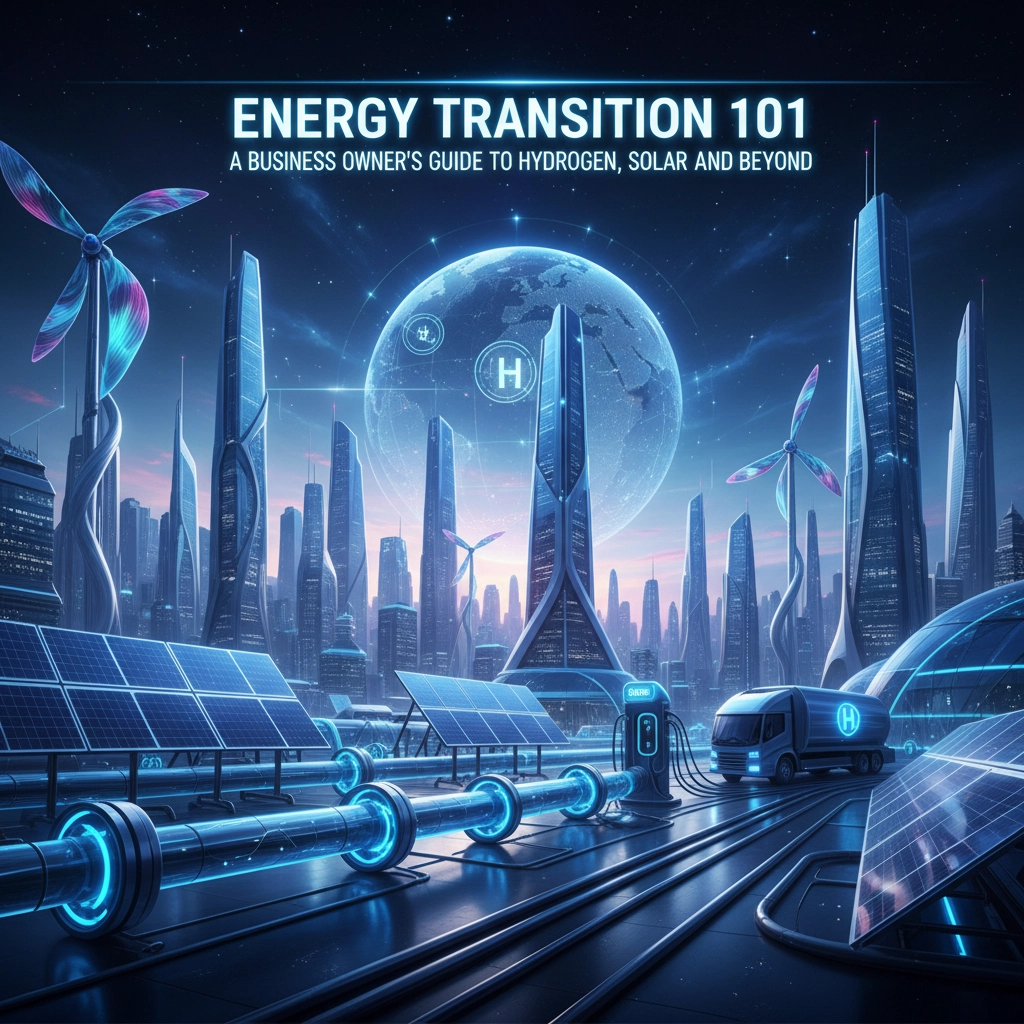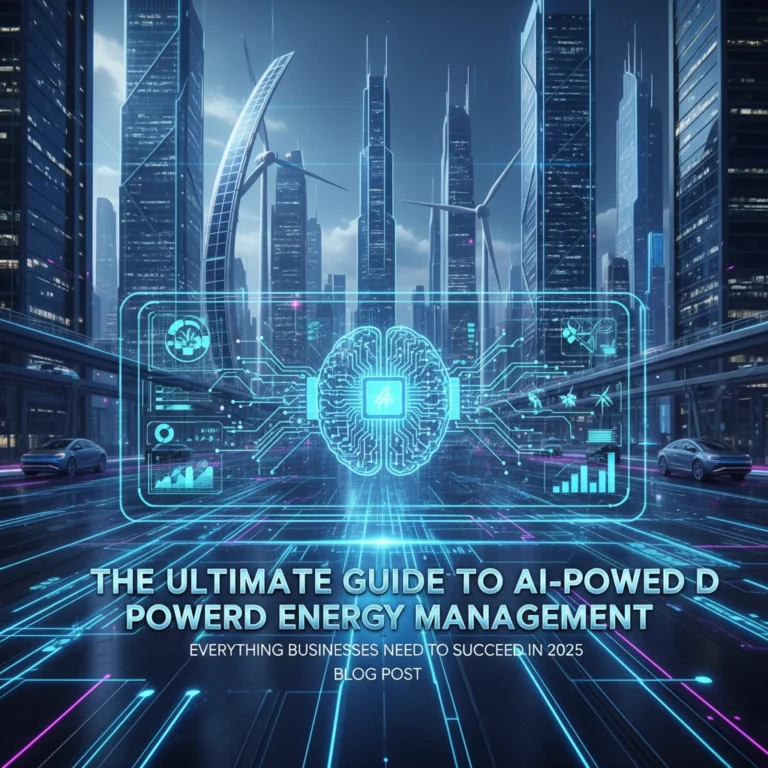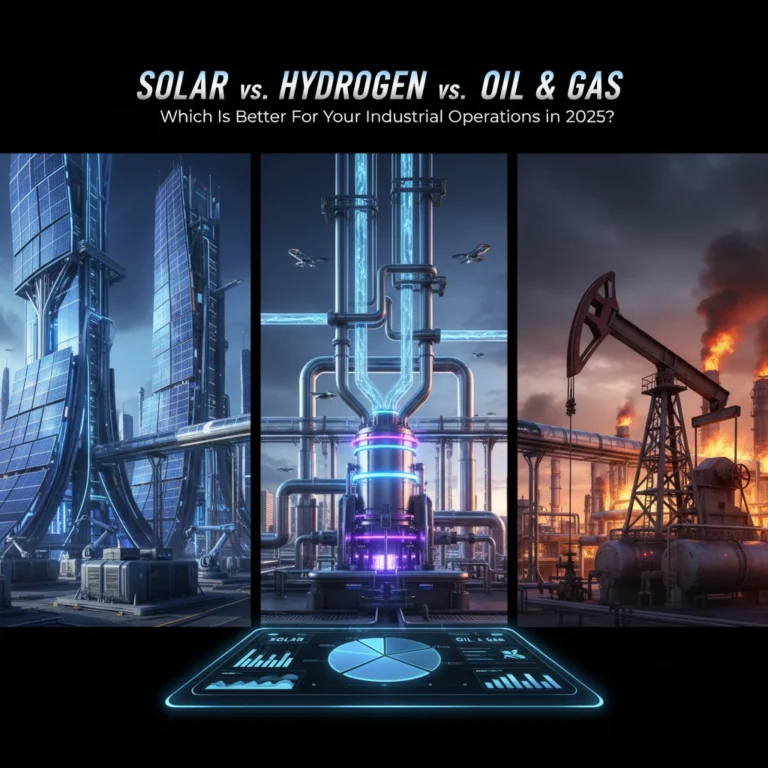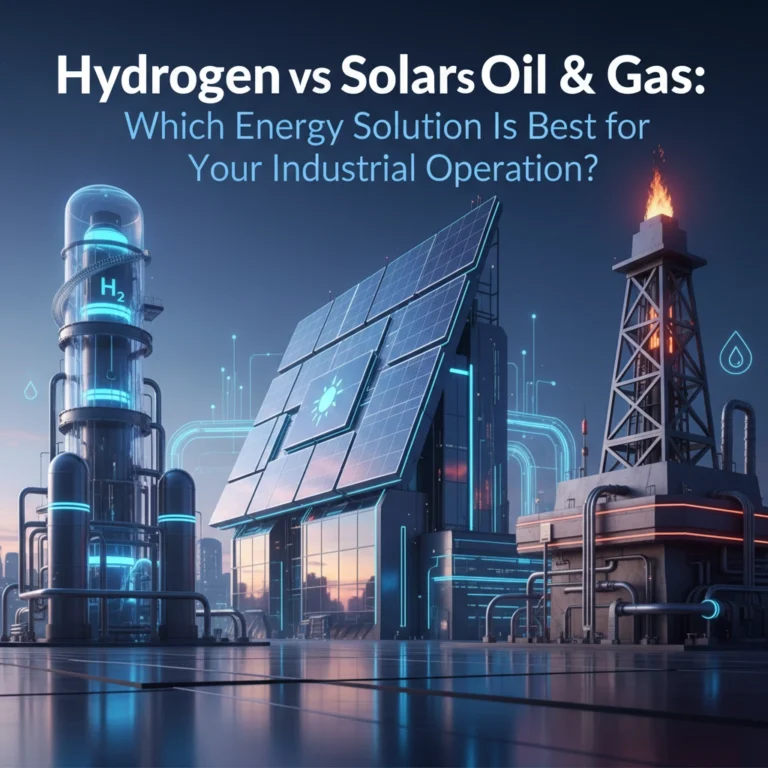Energy Transition 101: A Business Owner's Guide to Hydrogen, Solar, and Beyond
The energy landscape is shifting faster than ever, and smart business owners are asking the right question: "How do I navigate this transition without breaking the bank or disrupting operations?" If you're feeling overwhelmed by terms like "hydrogen for business," "solar for business," and "energy transition," you're not alone. The good news? You don't need a PhD in engineering to make smart energy decisions for your company.
Let's break down everything you need to know about business energy solutions in 2025 and beyond.
What Exactly Is the Energy Transition?
The energy transition is basically the global shift from fossil fuels to cleaner, renewable energy sources. Think of it as upgrading from a flip phone to a smartphone – it's not just about the technology, it's about completely changing how you operate.
For businesses, this transition represents both a challenge and a massive opportunity. Companies that get ahead of the curve often see significant cost savings, improved brand reputation, and better long-term stability. Those who wait? Well, they risk getting left behind as energy costs fluctuate and regulations tighten.
Why Traditional Energy Sources Still Matter (Yes, Really)
Before we dive into the shiny new technologies, let's address the elephant in the room: oil and gas aren't disappearing overnight. Smart businesses understand that the energy transition isn't about flipping a switch – it's about strategic diversification.
Oil & gas brokering remains a crucial part of many business energy strategies. Why? Because reliability matters. While you're building your renewable energy portfolio, you still need consistent, affordable energy to keep the lights on. A skilled energy broker can help you navigate volatile markets, secure better rates, and time your purchases strategically.

The key is finding the right balance. Many successful businesses use traditional energy sources as a stable foundation while gradually incorporating renewable options. This approach minimizes risk while maximizing long-term benefits.
Solar for Business: Your Gateway to Energy Independence
Solar power has become the poster child of renewable energy, and for good reason. Solar for business offers immediate, tangible benefits that even the most skeptical CFO can appreciate.
The numbers don't lie: Many businesses see 15-30% reductions in their energy costs within the first year of solar installation. But the real magic happens over time. While utility rates keep climbing, your solar-powered business enjoys predictable energy costs for decades.
Here's what most people don't realize about business solar installations:
Size matters, but not how you think. You don't need a massive warehouse roof to benefit from solar. Even smaller commercial installations can significantly impact your bottom line, especially when combined with smart energy management systems.
Financing options are more flexible than ever. Power Purchase Agreements (PPAs) let you go solar with zero upfront costs. You simply pay for the power generated, often at rates lower than your current utility bills.
Tax incentives are substantial. The federal Investment Tax Credit (ITC) can cover up to 30% of your solar installation costs, and many states offer additional incentives that can make solar incredibly attractive financially.
Hydrogen for Business: The Game-Changer You Haven't Considered
Now, let's talk about the technology that's got energy experts really excited: hydrogen. If solar is the reliable workhorse of renewable energy, hydrogen is the versatile Swiss Army knife.
Green hydrogen – produced using renewable energy to split water molecules – offers something no other clean energy technology can: long-term storage and transport without emissions. This makes it perfect for businesses with fluctuating energy needs or those in remote locations.

Consider this scenario: Your manufacturing facility runs 24/7, but your solar panels obviously only work during daylight hours. Traditional batteries can store energy for hours or days, but hydrogen can store energy for weeks or months. When you need power, fuel cells convert the hydrogen back into electricity with zero emissions.
Industrial applications are where hydrogen really shines. If your business involves high-temperature processes, heavy transportation, or chemical manufacturing, hydrogen might be your ticket to decarbonization without compromising performance.
The hydrogen market is exploding right now. Global investment in green hydrogen production is expected to reach unprecedented levels, with production capacity growing 15-fold by 2027. Early adopters are positioning themselves advantageously in supply chains that will soon prioritize low-carbon operations.
Beyond the Basics: Zero-Point Energy and Emerging Technologies
Here's where things get really interesting. While solar and hydrogen dominate today's renewable energy conversations, cutting-edge research is opening doors to technologies that seemed impossible just years ago.
Zero-point energy research represents the frontier of energy innovation. While still in development phases, this technology explores harnessing the quantum energy that exists in empty space itself. Think of it as the renewable energy equivalent of discovering electricity – potentially revolutionary, but requiring significant research and development investment.
For forward-thinking businesses, staying informed about emerging technologies isn't just curiosity – it's strategic planning. The companies that recognized the potential of early solar technology gained massive competitive advantages. The same principle applies to next-generation energy solutions.

Creating Your Business Energy Strategy: A Practical Roadmap
So how do you actually navigate this energy transition without getting overwhelmed? Here's a step-by-step approach that works:
Step 1: Audit Your Current Energy Use
Before making any decisions, understand exactly how and when your business uses energy. Most companies discover significant inefficiencies during this process alone.
Step 2: Diversify Gradually
Don't put all your eggs in one energy basket. Start with the most economically attractive option (often solar), while maintaining reliable traditional sources through strategic oil & gas brokering.
Step 3: Think Long-Term
Energy decisions you make today will impact your business for 20-30 years. Consider not just current costs, but future regulations, technology improvements, and market trends.
Step 4: Partner with Experts
Energy transition isn't a DIY project. Work with professionals who understand both traditional and renewable energy markets. The right partners can help you avoid costly mistakes and maximize available incentives.
The Financial Reality: Making the Numbers Work
Let's talk money, because that's what really matters to business owners. The energy transition isn't just about being environmentally responsible – it's about being financially smart.
Short-term costs vs. long-term savings: Yes, renewable energy often requires upfront investment. But energy costs are typically one of your largest operational expenses. Small improvements in energy efficiency and strategic renewable energy adoption can dramatically impact your bottom line over time.
Risk management: Energy price volatility affects every business. Renewable energy provides price certainty, while traditional energy sources offer supply reliability. The combination provides the best risk management strategy.
Incentive timing: Government incentives for renewable energy are generous now, but they're designed to decrease as adoption increases. Businesses that act sooner rather than later often capture the most attractive financial packages.
Your Next Steps in the Energy Transition
The energy transition isn't a trend – it's the future of business operations. Companies that approach it strategically, combining traditional reliability with renewable innovation, will thrive in the coming decades.
Whether you're interested in exploring solar installations, investigating hydrogen solutions, optimizing oil & gas procurement, or learning about cutting-edge energy research, the key is to start with a clear understanding of your current energy profile and long-term business goals.
The energy transition represents the biggest shift in how businesses operate since the industrial revolution. The question isn't whether you'll eventually need to adapt – it's whether you'll lead the change or scramble to catch up. Smart business owners are making moves now, positioning themselves advantageously for an energy-efficient, cost-effective, and sustainable future.
Ready to explore your options? Get in touch to discuss how the right energy strategy can transform your business operations and bottom line.







